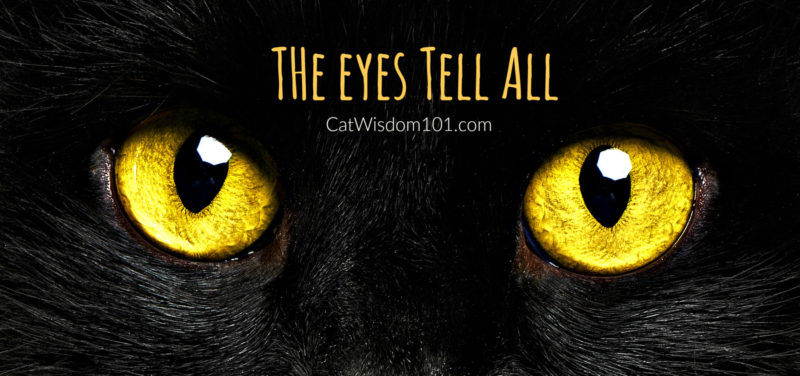
Vet 101: The Eyes Have It. Feline Herpes and Eye Infections
Feline Herpes and Eye Infections. UPDATED.
Our vet, Dr. Rich Goldstein tackled feline herpes in one of our first Vet 101 reader questions. Two years later, we’d like to circle back to talk about all feline eye issues. One of our dear cat blogger friends Nellie, recently had a sudden flare-up of herpes and lost vision in one eye. Our Gris Gris and Domino have occasional herpes flare-ups and Odin lost an eye to an eye infection. Lately, we’ve noticed many cats online with eyes issues and decided to get Dr. G’s sound advice. Gris Gris (pictured above earlier this summer) with the runny eye of a herpes flare-up.

Q: What eye infections other than herpes are contagious to cats? Are my other cats at risk? The runny eyes looks so unpleasant. Can I wipe it with a warm wet cloth or what?
A:If the eyes are the “windows to the soul”, then it’s of the utmost importance to keep our cats eyes open and clear!
There are many things that can upset a cat’s eyes. But let’s focus on one of the more common disorders: conjunctivitis – where the eyes become red, inflamed, and ooze a yucky discharge. Here’s a look at the potential causes of those red, oozy eyes.
INFECTION: Infections can be caused by viruses, bacteria, fungi, and mycoplasmas.
Viral infections, such as herpes (FHV-1, or the rhinotracheitis virus) and calicivirus, are among the most common causes of conjunctivitis in cats. Unchecked, the herpesvirus can lead to infections of the cornea, iris, and retina, and can result in blindness, which the poor Siamese kitty can attest to.
Although feline herpes and human herpes are different (and not transferable between cats and humans), they work similarly: once they are in the body, they stay there, usually dormant, with occasional flare-ups brought on by some sort of stress. People get cold sores, cats get conjunctivitis. There are medications that can help bring acute flare-ups under control, and some long term medications that may help reduce the number of flare-ups, which your vet can advise you on.
Herpes and calicivirus are generally spread through contact with an infected cat’s secretions. Infected queens can pass it to their kittens. YOU can also spread it to your cat if you’ve had contact with an infected cat and bring it home! So, ALWAYS wash your hands, disinfect your shoes, and change your clothes if you’ve had contact with a sick cat before going home. In addition, the “big 3” viruses in cats: feline leukemia, feline immunodeficiency virus, and feline infectious peritonitis (coronavirus), are all potential contributors to eye infections, and are potentially contagious to other cats.
- Primary bacterial causes of eye infections (from Staph or Strep) in cats are not very common. Bacteria are usually secondary invaders, following a viral infection. However, the bacteria Bordetella and Chlamydophila can cause primary infections, and are potentially contagious to other cats.
- Mycoplasmas are the smallest free-living organisms, and are becoming recognized more and more as causes of respiratory, urinary, joint, and other infections in cats. Mycoplasmas are frequently found as normal residents in the respiratory tract. But immunosuppression from other diseases may be partially responsible for its ability to cause disease.
- Ringworm is a fungal infection that can cause inflammation and irritation of the eyelids, which can secondarily lead to conjunctivitis and eye discharge. And we all know that ringworm is potentially contagious to other cats and people!

ALLERGIES
While not a common cause of eye infections, allergies can cause conjunctivitis in cats, which is not contagious. Allergies can be treated with antihistamines, or, in extreme cases, steroids. BUT (and it’s a big BUT), steroids must be used with absolute caution in cats with conjunctivitis. Since viral infections are MUCH more likely to cause conjunctivitis in cats, steroids can potentially make those infections worse.
ANATOMIC ISSUES
- Keratoconjunctivitis sicca (“dry eyes”), glaucoma (increased pressure in the eyes), corneal scratches, misplaced eyelashes (distichia), and eyelid defects (like entropion) are all potential causes of eye infections and should be ruled out for all red, infected eyes. None of these are contagious – although I did once see 3 cats in the same house that had scratches on the corneas at the same time – from the same encounter with a new puppy!
THE ALL-ENCOMPASSING “OTHER” CAUSES
Continuing the theme that the eyes are the windows to the soul, any “systemic” disease can potentially manifest itself through an eye infection. How many times did your mom know you were sick because your eyes were “glassy”? That’s why vets always ask so many questions. Sometimes it’s not just a “simple” eye infection. The eyes may be merely showing us the way to the underlying problem. So, please indulge us when we sound like the inquisition!
As you can see, there are many things that can cause an “eye infection.” Some are potentially contagious to other cats, while some can be indicators of a more involved problem. The good news is that there are very effective vaccinations available to prevent feline herpes, calicivirus and feline leukemia. There are also some new, very effective diagnostic tests and treatments available for some stubborn eye problems in cats, which you can speak with your vet about. Runny inflamed eyes can be very uncomfortable. You can use a soft, moist wash cloth to gently keep the eyes clear, keeping in mind that, while some cats will appreciate that, some cats will resent it. But NEVER put anything in a cat’s eyes without speaking to your vet first.
And, when treating the eyes, always make sure your cat’s favorite Johnny Nash song, is playing in the background so he’ll keep his eye on the bigger picture. (Anybody? … “I Can See Clearly Now” of course!)





14 Comments
mandy
Hi Peeps! I have a cat with Herpes and he has spots in his eyes. My other cat has developed glaucoma in her right eye. Are these two related? They are both older cats. They don’t seem affected.
Mav
Hello,
I have a 7 month old kitten who has the herpes virus and it is affecting his left eye. The third (inner) eyelid is always exposed, and his other eyelids and slightly deformed. I have been trying to control the herpes with drops, famciclover and L-lysine supplements, but there never seems to be any change.
Now my vet has suggested having the eye removed completely. Is this something you would advise?
Layla Morgan Wilde
Sorry to hear about your cat. If you trust your vet, listen to him. Surgery is a big deal so if in doubt, see another vet for a second opinion.
Bethany
Omg you have had 2 cats the same name as 2 of my cats!! I have rebel, domino and odin!
Layla Morgan Wilde
That’s cool!
live
awesome camsex. live live
Penelope
What a great post!
Thanks for bringing up this important topic. Nellie got her herpes from her mother when she was born. Nellie is a rescue cat and was born in a kitten mill.
She has only had 2 flare-ups. The first was right after she came to live with us. That was when we found out about cat herpes. Nellie also has allergies, so when this years problems started, we thought it was just allergies. When it lasted for more than a week, we took her to the vet. The vet told us this was a serious flareup and we were diligent with the medications and the flushing of her eye, and were in constant contact with the vet, but alas the infection has robbed Nellie of the sight in that eye. She still has a little discharge from both eyes and we continue with the polysporin and the eye flushing for both eyes. She is NOT uncomfortable, nor in distress. She is active, eating well and has no elimination issues. All we can do is try to prevent any ulcerations that would necessitate the removal of her eye.
We have 2 other cats and we have been diligent in washing hands and monitoring them to ensure they don’t get herpes from Nellie. When we took Jo-Jo in for her kitten shots, the vet checked her out and she feels that our other 2 cats will not be in any danger.
Thanks again for this post!
Nellie’s Mom
Skeeter and Izzy
Super good infoas always Dr. G! Luv the bit o song humor! Thanks Doc for taking the time to educate us!
Luvs Skeeter and Izzy and the Feral Gang >^..^<
Flynn
Very interesting post. I once had a cat that had an ulcer on her eye that burst. Luckily our vet specialises in eyes and put a graft over the ulcer using the third eyelid. Once the graft had taken he separated it from the rest of the third eyelid and she retained peripheral vision in that eye. He is the same vet who just removed Speedy’s eye.
Brian
That was really good. We had a kitty with the herpes once.
Angel Abby
Excellent post, filled with lots of terrific information!
da tabbies o trout towne
doodz…grate post with sum good add vise…..THANX !
Kitties Blue
Thanks for this great post. I wish it had mentioned something about a cat that has one eye that has a clear discharge on occasion. Giulietta has that problem. It may last a few days or a couple weeks and then go away just to pop up again at a later date. Purrs and hugs, Lily Olivia, Mauricio, Misty May, Giulietta, Fiona, Astrid, Lisbeth and Calista Jo
Sue Brandes
We have been dealing with this with my Garfield. He also has an eye ulcer on top of the Herpes. Has very limited vision in the one eye that is affected. I had never heard of it till he got it. Lots of vet visits and meds. I have a wonderful caring vet. Great post.